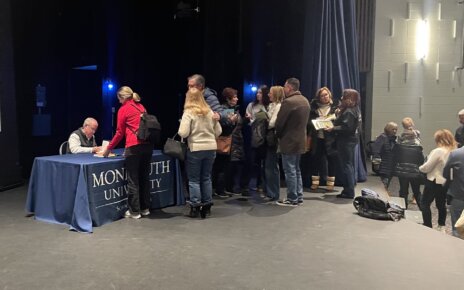Monmouth University hosted a virtual discussion panel with Tony MacDonald and Randall Abate to explore their impressions of the UN’s COP26 climate change summit on Thursday, Dec. 2.
MacDonald, Director of Monmouth University’s Urban Coast Institute (UCI), and Abate, Rechnitz Family/UCI Endowed Chair in Marine and Environmental Law, attended the conference in Glasgow as observers in the “Blue Zone.”
MacDonald submitted an application on behalf of the university’s Urban Coast Institute to become an official observer at the convention in fall of 2020, and the university was offered two spaces to participate in the meeting.
“They reduced the number of people they could send this year because of the COVID protocols,” explained MacDonald. “We were a little bit skeptical with everything going on, but when we got reassured that the meeting was being organized well we made plans and were fortunate enough to go. It was really a great experience.”
Abate described the intensive COVID testing protocols that were in place at the convention, which required everyone to conduct daily self tests and produce a negative result before entering the venue. “We were tested to death, but it was all for a good purpose,” he joked.
“More specific to the experience at the actual event, the Covid protocols just delayed things and restricted access in a way that was frustrating,” he continued. “The number of people allowed in the rooms was severely restricted. I had at least three or four sessions that I really wanted to attend but the door was shut and I was on a wait list that I was not able to get off of. I was literally running from event to event trying to avoid that, and it was unavoidable.”
Many developing countries were unable to send representatives to Glasgow to attend the conference in-person due to COVID travel restrictions. Participation was further hindered due to technical difficulties experienced during the first few days of the convention that limited their ability to participate remotely.
MacDonald described COP26 as “a big convention for climate nerds” and admired the networking opportunities it presented. Abate, however, had a very different networking experience and expressed that he often felt that the environment was overwhelming. “It was a landscape that was very different for me, having primarily attended academic conferences in my career,” he said.
MacDonald and Abate also had different perspectives about the successes and shortcomings of the conference, with Abate tending to have more pessimistic views about what he felt was unsubstantial progress.
“I’ll try to say this with as little cynicism as I can – I would characterize the positive outcomes as seizing the low-hanging fruit. They’re far better than not moving forward on these issues, but they are baby steps in the grand scheme of things,” said Abate.
Specifically, he referenced agreements among over 100 nations to reduce methane emissions by 30 percent by 2030 and commitments from countries with 90 percent of the world’s forests to halt and reverse deforestation in that same time frame. According to Abate, these agreements were already being discussed prior to COP26 and were merely confirmed during the conference.
“I’m a little bit less cynical than Randy even though I agree with everything he said,” commented MacDonald. He went on to explain general changes in attitude and high ambitions he observed at the conference that he believed were indicative of progress, specifically noting increased engagement from the private sector and commitments made by the U.S. to decarbonize the shipping industry and electrify vehicles.
Adding to the conversation about U.S. involvement, Abate commented on the nation’s recent role in the climate crisis and the influence politics has had on climate engagement. “One thing to take away from the U.S. and its engagement on climate change for the past three decades is that regardless of whether we’ve had a Republican or a Democratic administration, it’s been well below where it needs to be,” he explained. “The U.S. needs to be the leader that it was on international environment issues in the 80’s. We were a leader, and then we became part of the problem for the next three decades.”
Still, the U.S. has taken steps in the right direction to better address the climate crisis. Notable progress has been made since the Trump administration, reengagement in the COP process being one of the most prominent improvements thus far. Still, Abate pointed out that the Biden administration can only make so much progress without Congressional support, which has remained largely divided when it comes to implementing climate legislation.
Youth engagement was also cited as another avenue of progress at COP26. Abate noted the importance of involving youth activists in climate change regulation because “it’s the future they’re going to inherit,” but was still critical of what he described as participation opportunities that were “better than nothing, but certainly not at the level that it should be.”
Upon their return to Monmouth, Abate and MacDonald have been looking for ways to keep the conversation about climate change moving and incorporate it into different curriculums on campus.
“I think there are more opportunities than people recognize,” said MacDonald. “This is really an issue that will affect everybody, so there’s a role for anyone at Monmouth who’s interested in this whether it’s their career or not.”



